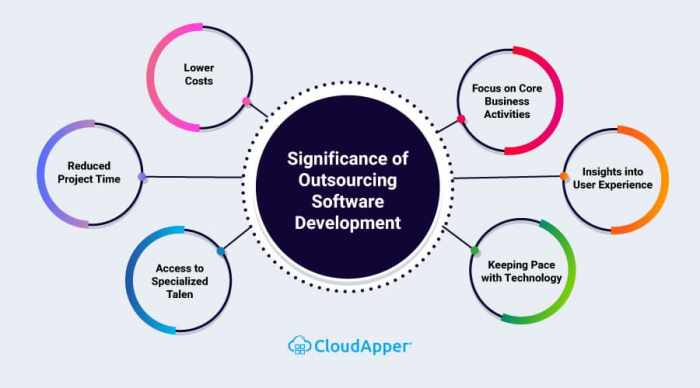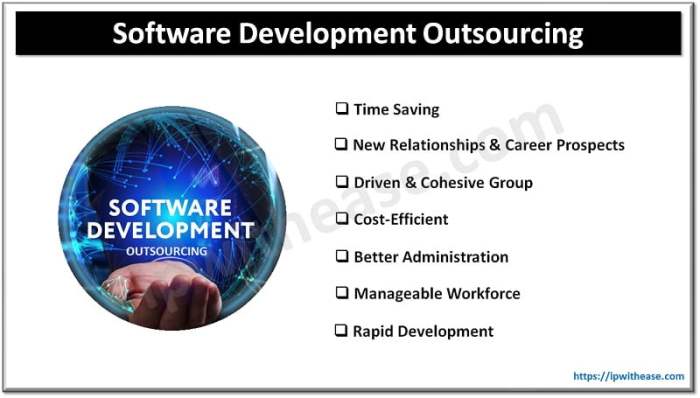Software development outsourcing & support services – In today’s dynamic business landscape, leveraging external expertise has become a strategic imperative. Software development outsourcing and support services offer a powerful avenue for companies to accelerate innovation, reduce costs, and gain a competitive edge. This comprehensive guide delves into the intricacies of outsourcing software development, exploring its benefits, challenges, and best practices. We will also cover crucial aspects of ongoing support and maintenance to ensure the long-term success of your outsourced projects.
Understanding Software Development Outsourcing
Software development outsourcing involves contracting a third-party company or individual to handle all or part of your software development needs. This can range from designing and developing custom applications to maintaining existing systems. Outsourcing offers flexibility, allowing businesses to scale their development efforts up or down based on project requirements and budget constraints. The decision to outsource often hinges on factors like cost-effectiveness, access to specialized skills, and the need to focus internal resources on core competencies.
Types of Software Development Outsourcing Models
- Onshore Outsourcing: Engaging a company within the same country. This offers benefits such as easier communication and potential for face-to-face meetings.
- Nearshore Outsourcing: Partnering with a company in a geographically proximate country. This balances cost savings with relatively easy communication and time zone alignment.
- Offshore Outsourcing: Contracting a company in a distant country, often resulting in significant cost savings but potentially posing communication and time zone challenges.
- Project-Based Outsourcing: Engaging a vendor for a specific project with a defined scope and timeline.
- Dedicated Team Outsourcing: Building a dedicated team within the outsourcing company that works exclusively on your projects.
Benefits of Software Development Outsourcing
- Cost Reduction: Access to lower labor costs, especially with offshore outsourcing.
- Access to Specialized Skills: Tap into a global talent pool with expertise in niche technologies.
- Increased Efficiency and Productivity: Focus internal resources on core business functions while outsourcing non-core activities.
- Faster Time-to-Market: Leverage the expertise and resources of the outsourcing partner to accelerate project delivery.
- Scalability and Flexibility: Easily scale your development efforts up or down based on project demands.
- 24/7 Support: With global teams, support can be available around the clock.
Choosing the Right Software Development Outsourcing Partner
Selecting the right outsourcing partner is crucial for project success. A thorough vetting process is essential, considering factors like:
Key Considerations When Selecting a Partner, Software development outsourcing & support services
- Experience and Expertise: Review the partner’s portfolio, client testimonials, and technological capabilities.
- Communication and Collaboration: Assess their communication protocols, responsiveness, and ability to work effectively across time zones.
- Security and Confidentiality: Verify their security measures to protect sensitive data and intellectual property.
- Project Management Capabilities: Evaluate their project management methodologies and ability to deliver projects on time and within budget.
- Legal and Contractual Aspects: Carefully review the contract to ensure clarity on deliverables, payment terms, and intellectual property rights.
- Cultural Compatibility: Consider cultural differences and their potential impact on communication and collaboration.
Software Development Outsourcing Support Services
Ongoing support and maintenance are crucial for the long-term success of any software project. Outsourcing partners often provide a range of support services, including:
Types of Support Services
- Bug Fixing and Patching: Addressing bugs and vulnerabilities to maintain software stability and security.
- Technical Support: Providing assistance to end-users experiencing issues with the software.
- Maintenance and Updates: Implementing regular updates and upgrades to improve functionality and security.
- Performance Monitoring: Tracking software performance and identifying areas for improvement.
- Security Audits: Regularly assessing software security to identify and mitigate potential vulnerabilities.
- 24/7 Monitoring and Support: Providing round-the-clock support to ensure business continuity.
Challenges of Software Development Outsourcing
While outsourcing offers many advantages, it’s important to be aware of potential challenges:
Potential Pitfalls to Avoid
- Communication Barriers: Differences in language, culture, and time zones can hinder effective communication.
- Quality Control: Ensuring the quality of the outsourced work requires robust quality assurance processes.
- Security Risks: Protecting sensitive data and intellectual property requires careful consideration of security measures.
- Intellectual Property Rights: Clearly defining intellectual property rights in the contract is essential.
- Hidden Costs: Unexpected costs can arise from unforeseen issues or changes in project scope.
Best Practices for Successful Software Development Outsourcing
To maximize the benefits and mitigate the risks of outsourcing, consider these best practices:

Source: cloudapper.ai
Tips for a Successful Outsourcing Strategy
- Clearly Define Requirements: Develop detailed specifications and documentation for the project.
- Establish Clear Communication Channels: Implement effective communication protocols to facilitate collaboration.
- Implement Robust Quality Assurance Processes: Establish rigorous testing and quality control procedures.
- Monitor Progress Regularly: Track progress closely and address issues promptly.
- Build Strong Relationships: Foster a collaborative relationship with your outsourcing partner.
- Choose the Right Outsourcing Model: Select the model that best suits your needs and resources.
Frequently Asked Questions (FAQ)
- Q: How much does software development outsourcing cost? A: The cost varies significantly depending on factors such as project complexity, location of the outsourcing partner, and the chosen outsourcing model.
- Q: How do I choose the right outsourcing partner? A: Consider factors like experience, expertise, communication skills, security measures, and contractual terms.
- Q: What are the risks of software development outsourcing? A: Potential risks include communication barriers, quality control issues, security risks, and intellectual property concerns.
- Q: How can I ensure the quality of the outsourced work? A: Implement robust quality assurance processes, including regular testing and code reviews.
- Q: What are the benefits of software development outsourcing? A: Benefits include cost reduction, access to specialized skills, increased efficiency, faster time-to-market, and scalability.
- Q: What types of software development can be outsourced? A: Virtually any type of software development can be outsourced, from web and mobile applications to enterprise systems and embedded software.
Conclusion
Software development outsourcing and support services offer a powerful way for businesses to achieve their software development goals efficiently and cost-effectively. By carefully selecting a reliable partner, establishing clear communication channels, and implementing robust quality assurance processes, companies can leverage the benefits of outsourcing to gain a competitive edge in today’s rapidly evolving technological landscape. Remember to thoroughly research potential partners and prioritize clear communication throughout the entire project lifecycle.

Source: ipwithease.com
References: Software Development Outsourcing & Support Services
- Gartner (for market research and insights)
- Forbes (for business and technology news)
- CIO (for IT leadership insights)
Call to Action
Ready to explore the benefits of software development outsourcing? Contact us today for a free consultation and let’s discuss how we can help you achieve your software development goals.
Essential FAQs
What are the common risks associated with software development outsourcing?
Common risks include communication barriers, intellectual property concerns, quality control issues, and potential time zone differences impacting collaboration.
How can I ensure the security of my data when outsourcing software development?
Thoroughly vet potential partners, insist on robust security protocols, and include strong data protection clauses in your contract. Regular security audits can also provide additional reassurance.
What are the typical payment models for outsourcing software development?
Common models include fixed-price contracts, time and materials billing, and dedicated team arrangements. The best model depends on project complexity and requirements.
How do I choose the right outsourcing partner?
Research potential partners, check their references, review their portfolios, and assess their communication skills and cultural fit. Consider their experience with similar projects and their commitment to quality assurance.
